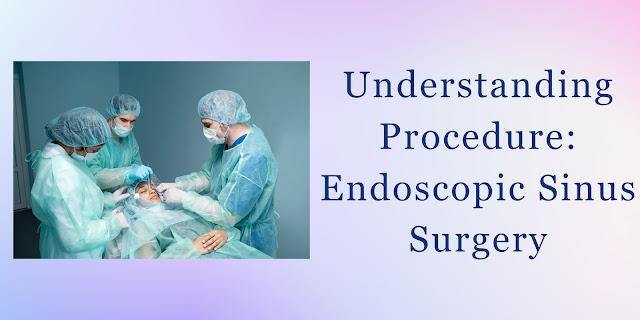Understanding the Procedure: What to Expect during Endoscopic Sinus Surgery
A common medical issue called sinusitis can result in recurring infections, long-term discomfort, and a reduced quality of life. Endoscopic sinus surgery may be suggested as a successful option for those who have tried every non-surgical treatment option. Get a consultation with the best sinus specialist in Coimbatore. What can be expected from endoscopic sinus surgery, a minimally invasive procedure intended to treat persistent sinus issues?
The Basics of Endoscopic Sinus Surgery
Functional endoscopic sinus surgery (FESS), commonly referred to as endoscopic sinus surgery, is a medical treatment used to treat a variety of sinus-related conditions, including sinus cysts, nasal polyps, and chronic sinusitis. In order to provide real-time visual access to the sinus cavities, an endoscope—a thin, flexible tube with a light and camera at its tip—is used. Comparing this less invasive method to standard sinus operations usually results in shorter recovery periods and less pain following the procedure.
Preparing for the Procedure
Patients usually go through a thorough pre-operative protocol before having endoscopic sinus surgery. This entails a comprehensive medical assessment and consultations with the surgical team to guarantee that surgery is the most appropriate line of action. To reduce potential issues, it is crucial that you inform your healthcare practitioner of your medical history and current medications. In certain instances, your surgeon might advise against taking any particular medications right before the surgery, especially ones that have an impact on blood coagulation.
In the hours preceding surgery, patients should also be ready for the possibility of dietary and exercise limitations. The purpose of these instructions is to lower the possibility of difficulties during the procedure.Usually, endoscopic sinus surgery is done as an outpatient procedure, so you should be able to return home the same day as the procedure. The process often takes one to two hours to finish, depending on how complicated the case is.
Anaesthesia: Local or general anaesthesia is administered prior to the start of the procedure. The surgeon's preference as well as the unique medical background and requirements of the patient influence the anaesthetic option. For longer surgeries, general anaesthesia is frequently used, but for simpler procedures, local anaesthesia combined with sedation could be adequate.
Endoscope Insertion: The surgeon uses the nose to enter the endoscope through to reach the sinus cavities once the patient has received the appropriate anaesthesia. The nasal passageways and sinus tissues are seen in great detail and amplified detail through the endoscope.
Removal of Obstructions: If the patient's problems are being caused by polyps, cysts, or other obstructions, the surgeon can remove them. By enhancing the passage of air and mucus in the sinuses, this step helps to reduce the symptoms of chronic sinus
Sinus Drainage: To facilitate improved drainage, the surgeon may, if necessary, make tiny incisions or widen already-existing sinus passageways. By doing this, the chance of obstructions and infections in the future is decreased.
Reconstruction: The surgeon might have to rebuild particular sinus structures in specific circumstances. To enhance general sinus function, this may entail removing diseased tissue or altering the nasal septum.
Closure: After the surgical goals are met, the endoscope is taken out and the incisions produced during the procedure are stitched together using dissolveable sutures.
Monitoring: After the Surgery
Patients are kept under observation in a recovery centre following surgery until they are stable and awake. In the days that follow the surgery, nasal discharge, congestion, and slight discomfort are possible. Antibiotics and painkillers are frequently administered to treat pain and lower the risk of infection.
Most patients are allowed to go home the same day as the surgery, but since you might still be unconscious from the anaesthesia, you need to make arrangements for someone to drive you home.
Individual recovery times can differ, but most people can anticipate returning to their regular activities in a few days to a week. It is imperative that you adhere to the post-operative instructions that your surgical team has provided.
Potential Benefits of Endoscopic Sinus Surgery
Patients with chronic sinus problems may benefit from endoscopic sinus surgery in a number of ways:
Symptom Relief: Chronic sinusitis symptoms like pressure, congestion, and facial pain can be effectively relieved by this procedure.
Improved Quality of Life: Because the surgery facilitates improved breathing and lowers the incidence of sinus infections, many patients report a considerable improvement in their general quality of life following the procedure.
Minimally intrusive: Endoscopic sinus surgery is less intrusive than standard sinus procedures, which leads to fewer complications and a quicker recovery.
Customised Care: Surgeons are able to adjust the operation to meet the individual needs of every patient, taking into account their particular sinus problems.
Risks and Considerations
As with any medical operation, endoscopic sinus surgery is not without risk, even though it is generally regarded as safe and successful. These could involve wounds to nearby structures, bleeding, infections, or scars. In order to make an informed choice, go over these possible hazards with your healthcare physician before to the procedure.
To sum up, endoscopic sinus surgery is a useful choice for people with persistent sinus problems. Patients might anticipate symptom reduction and an enhanced quality of life if they comprehend the operation, prepare adequately, and adhere to post-operative instructions. If you're thinking about having this operation, speaking with your sinus surgery doctor in Coimbatore is the best option for you. Keep in mind that every person has different experiences, therefore it's important to have reasonable expectations for the result.




Comments
Post a Comment